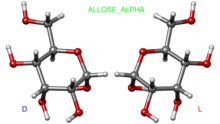Allose
Appearance
 | |
 | |
| Names | |
|---|---|
| Preferred IUPAC name
Allose | |
| Systematic IUPAC name
(2R,3R,4R,5R)-2,3,4,5,6-Pentahydroxyhexanal | |
| Identifiers | |
3D model (JSmol)
|
|
| ChEBI | |
| ChemSpider | |
PubChem CID
|
|
| UNII |
|
| |
| |
| Properties | |
| C6H12O6 | |
| Molar mass | 180.156 g·mol−1 |
| Melting point | 128 °C (262 °F; 401 K) |
Except where otherwise noted, data are given for materials in their standard state (at 25 °C [77 °F], 100 kPa).
| |
Allose is an aldohexose sugar. It is a rare monosaccharide that occurs as a 6-O-cinnamyl glycoside in the leaves of the African shrub Protea rubropilosa. Extracts from the fresh-water alga Ochromas malhamensis contain this sugar but of unknown absolute configuration. It is soluble in water and practically insoluble in methanol.
Reduction of allose by catalytic hydrogenation produces an obscure sugar alcohol allitol which is rarely used in the chemical industry.[2][3]
Allose is a C-3 epimer of glucose.
Notes
[edit]- ^ The Merck Index: An Encyclopedia of Chemicals, Drugs, and Biologicals (11th ed.). Merck. 1989. ISBN 091191028X.
- ^ Reusch, William (May 5, 2013). "Carbohydrates". chemistry.msu.edu. East Lansing, Michigan: Michigan State University. Retrieved January 21, 2025.
- ^ National Center for Biotechnology Information (2025). PubChem Compound Summary for CID 120700, Allitol. Retrieved January 21, 2025 from Allitol.
References
[edit]- Carbohydrates, edited by P.M. Collins, Chapman and Hall, ISBN 0-412-26960-0
